
 In His Words: Thameur Mejri
In His Words: Thameur Mejri
Thameur Mejri (born in 1982 in Tunis) presents his first solo exhibition at the Musée d’art contemporain de Lyon (MAC Lyon) this spring. Curated by Salma Tuqan and Matthieu Lelièvre, the show titled Until My Veins Collapse (States of Emergency) exposes visitors to different kinds of interdependencies, inequalities and forms of control. Mejri graduated from the Institut supérieur des Beaux-Arts in Tunis and currently lives and works in Nabeul. Mejri has exhibited internationally in Tunisia, USA, Ghana, UK and UAE. The present exhibition is first museum show and his first display in France.
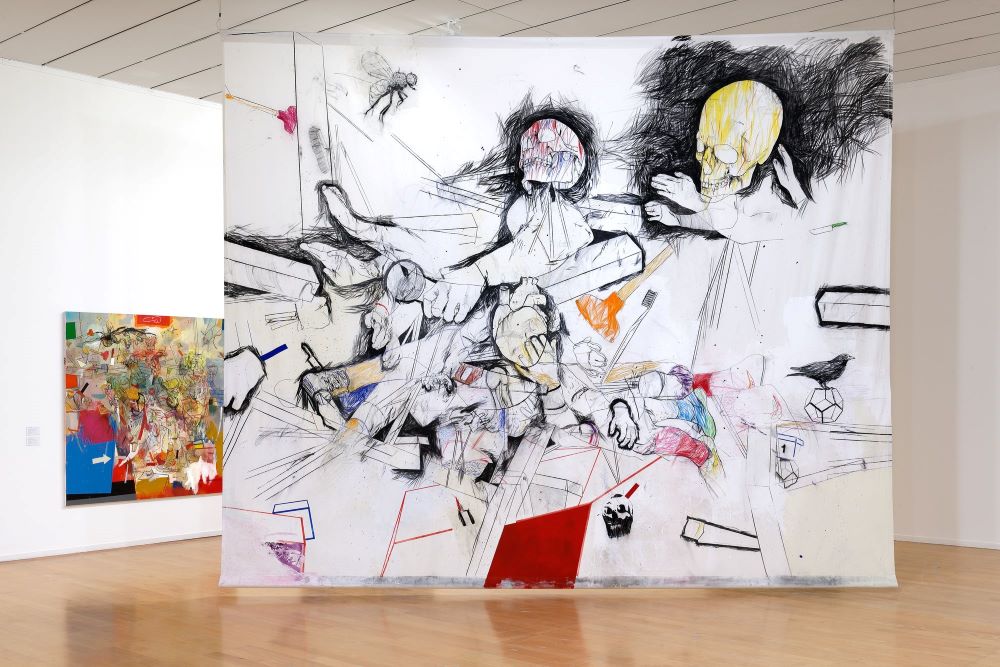

On his first museum exhibition:
‘It is very different to have an exhibition at a museum compared to a gallery show. Obviously, the museal space is much bigger–and it is quite important for an artist to know how much space you have to work with. My preference is a big space as I usually work on big pieces, too. The space at MAC Lyon allowed me to extend my practice and to do larger pieces. Another considerable difference between a museum exhibition and a gallery one has to do with pressure. It’s not quite the same to be exhibiting at a gallery with its inevitable commercial aspect. Somehow, even on an unconscious level, for a gallery exhibition one considers whether something will sell or not. At a museum, I think there is a bit more freedom, albeit no show is completely free of the considerations towards the market, and an opportunity to be experimental–to go further and explore new, uncharted territories as an artist.
I am excited about the exhibition and I definitely think it’s an achievement, but at the same time I see it as a starting point: hopefully this show will help me to take my career to a new level as it offers me more exposure and visibility. The show encourages me to think bigger and more ambitiously.’
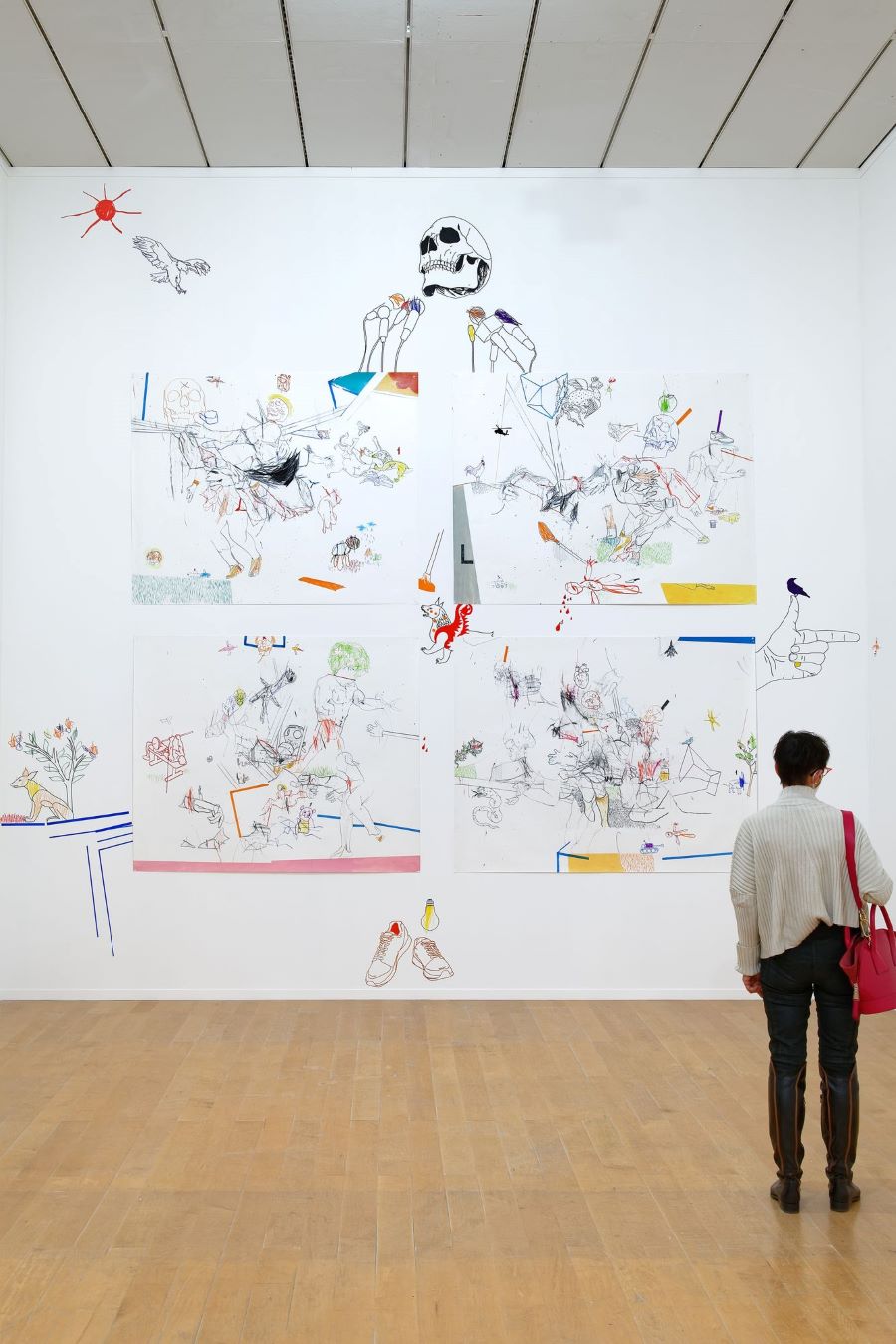

On the planning of Until My Veins Collapse (States of Emergency):
‘The background of this show dates back a couple of years. Matthieu Lelièvre saw my work at the Tunisian pavilion of the Dakar Biennale in 2018 and immediately contacted me afterwards. At the time he was working for a French foundation and curating different shows. I sent him my profile and we kept in touch: talking and exchanging ideas. Soon after, I received an opportunity to work with a gallery in Accra, Ghana. The owner asked me to prepare for a solo show and look for a curator and I immediately thought of Matthieu. He agreed and we started to work together. The collaboration has been fruitful–Matthieu gave a new breath to my art and practice. He, for instance, convinced me that it’s okay to use colour. After the show in Accra, Matthieu started to work as an art advisor for Isabelle Bertolotti, the director of MAC Lyon. A couple of weeks before the opening of our show in Accra, Matthieu told me that I’ve been selected to do a solo show at MAC Lyon–this came as a total surprise as he hadn’t said anything to me about such a possibility before. We started to plan for this exhibition in 2019, and Isabelle and Matthieu visited me in Tunisia during the very spring. Matthieu had the idea to include Salma Tuqan from the Delfina Foundation to the project too, as she would understand from well as we share a bit of the same background–Salma is Palestinian.’
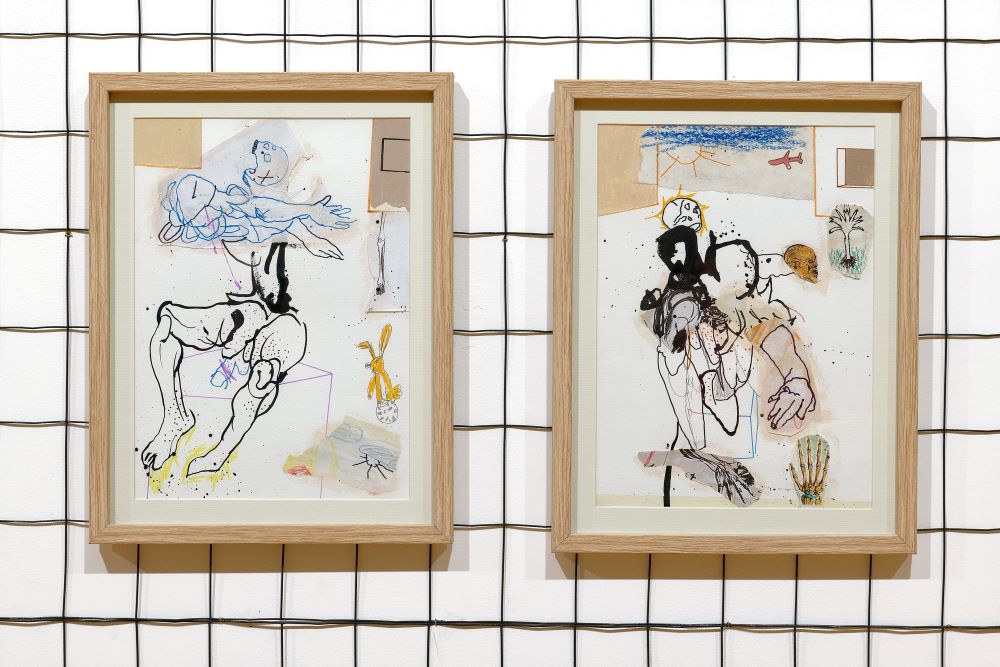

On working with Salma Tuqan and Matthieu Lelièvre:
‘Working with Salma and Matthieu has been absolutely incredible. Both of them have their own way of working and their distinct approach to curating. Salma’s participation has been a wonderful blessing. We met once a week, discussing a great number of things. She wanted to know who I am, who’s the artist behind the art. For her, the artist is at the centre of the practice and not the discourse. Matthieu, on the other hand, is more interested in the discourse; in the politics, the market and art history. Salma’s approach is more intimate. Together, these two approaches compliment each other and working with both of them has been an incredibly rich experience for me. After two years, I think I’m a better artist and a better person, ready to face bigger challenges.’
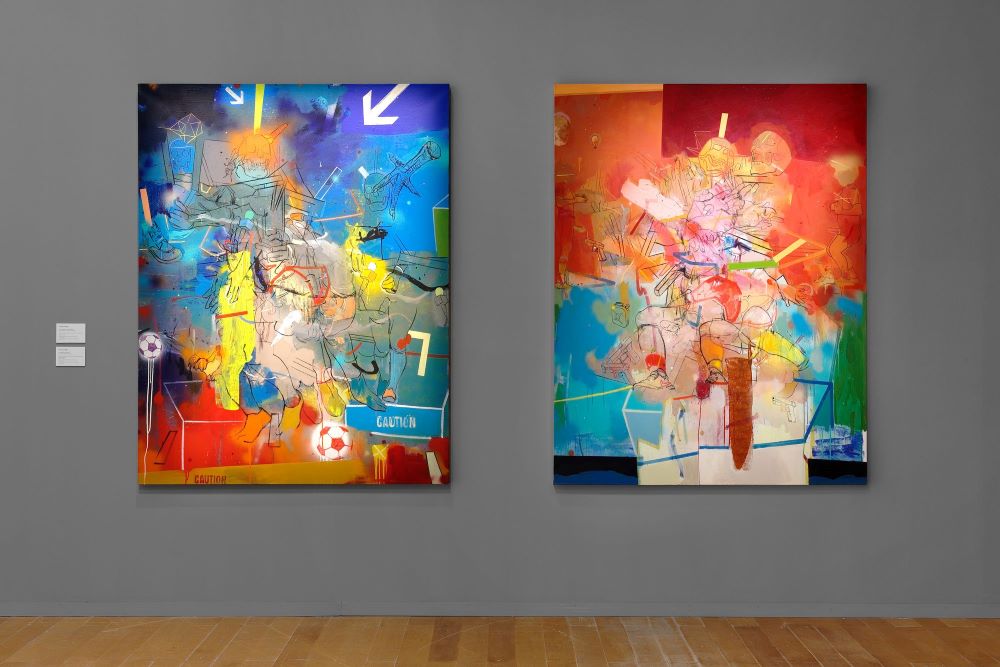

On Until My Veins Collapse (States of Emergency):
‘This exhibition invites visitors to reflect on the mechanisms and devices of power. The show is laid out into three separate rooms and the underlying idea is that in each room, visitors feel like they are stuck and trapped; that they have lost their comfort zone. The first room displays video artworks I made with my brother Kays Mejri, a filmmaker based in Montreal, in 2007 when I was still a student. These films contain iconography that is still present in my work and particularly in this show, too. From the very beginning, in this dark room without light with mute videos, visitors face a challenging space and lose their comfort. In this metaphor, visitors, then, give themselves to the show; the exhibition is taking power over the visitors, in a way. The underlying idea of examining the mechanism of power is also present in the architecture of the show. In the second room, visitors will find a number of paintings: the iconography, the body, the violence. Now, visitors are presented with the conditions I chose as an artist; I put you here. In the third room, visitors see the big pieces I’ve recently worked on. They are about 6.5 metres tall. Here, the paintings might feel visitors a bit threatened with their great size. Here, too, the idea is to challenge visitors and take them out of their comfort zone, and, in a way, control them. All the three sections are separated by a plastic veil from the butcher’s. This makes all of the rooms independent, yet there’s an element of crescendo, everything’s building up.’
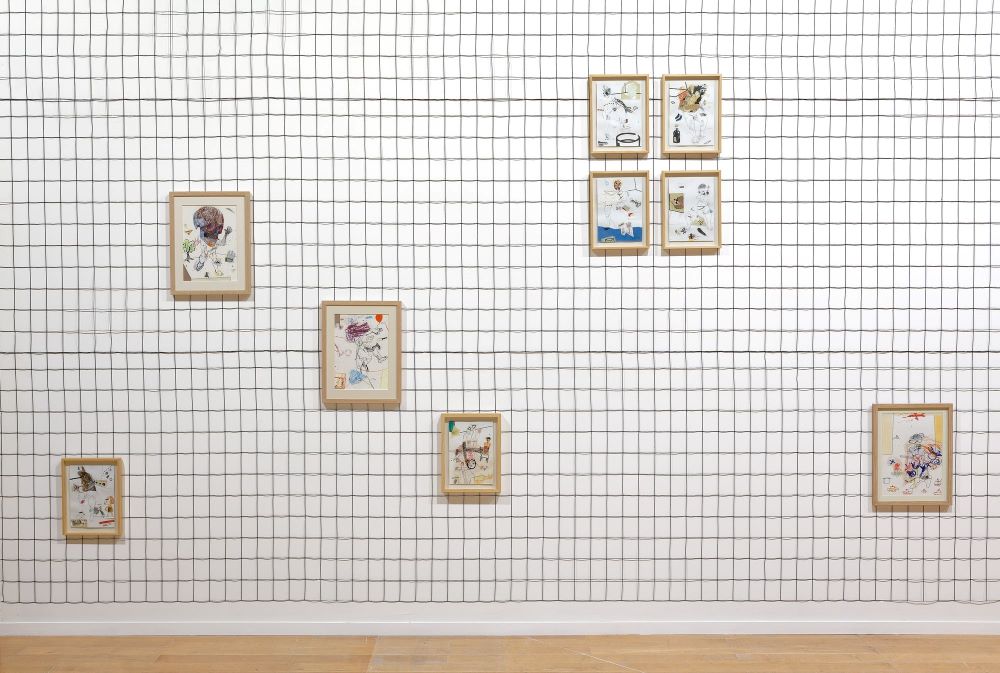

On the concept of power:
‘Power is everywhere and everything. It’s the culture you’re in, where we were raised, the architecture of the place. Heritage is also a form of power, and so is the history of a place. I see power everywhere. Just like Foucault said, in every interaction of two people or more, there’s power, someone is exerting power over the other one. I see a lot of determinism here. We can’t escape, flee or resist these powers. The concepts and mechanisms of power inherently rest in the structure where we live and eventually die. I combine these notions of power with tactility and physicality of our bodies because in my view, everything goes back to the body: everything starts with our bodies. Knowledge, philosophy, our thoughts, fantasies, ideas of fiction, they all come from our bodies. I don’t think we can separate between the body and “the things”, the non-physical stuff. There is no way of escaping the body–it’s always there.’
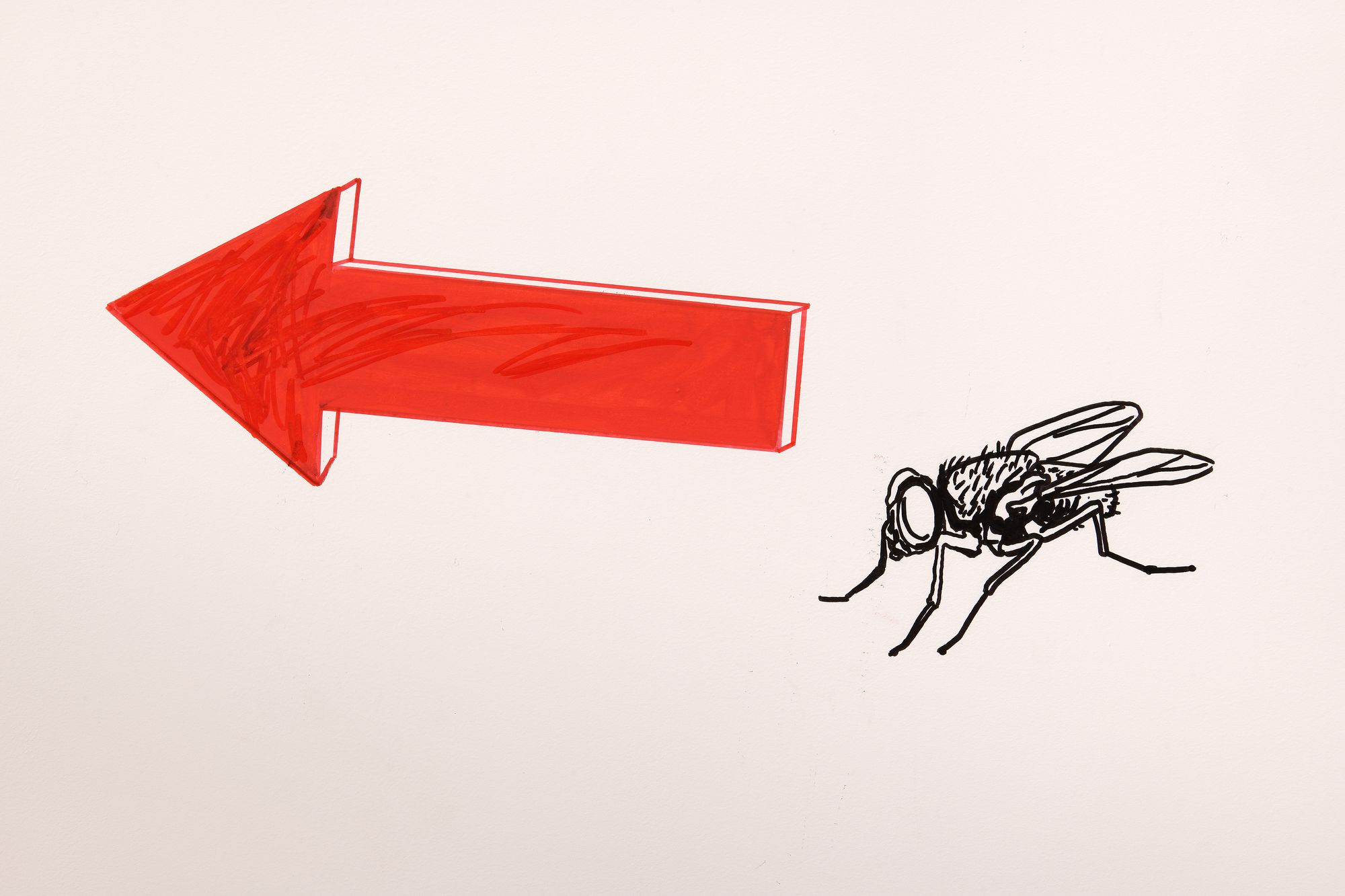

Follow Thameur Mejri on Instagram here and check out the exhibition at MAC Lyon here.
Mejri’s portrait: Courtesy of Firas Ben Khelifa.
You might also like:


 In His Words: Thameur Mejri
In His Words: Thameur Mejri 
